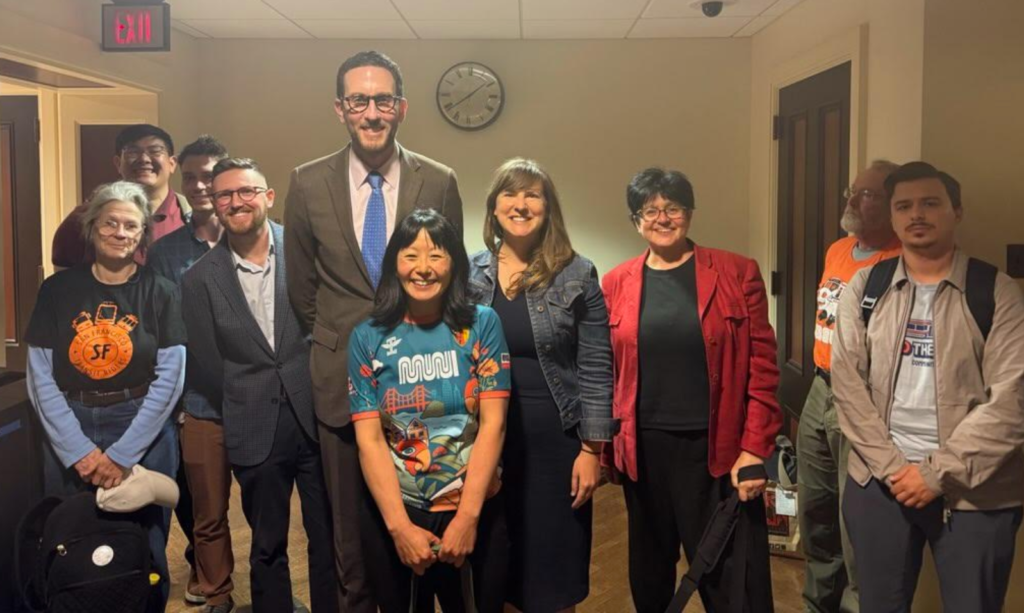On Monday afternoon in Sacramento, the Assembly Transportation Committee passed Senate Bill 63, the bill authorizing a regional transit funding measure for the Bay Area. The measure would be put on the ballot by a signature gathering initiative in 5 counties (San Francisco, Alameda, Contra Costa, San Mateo, Santa Clara). The measure would be a half-percent sales tax outside of San Francisco, and a full percent in San Francisco.
The next step will be votes on the Assembly and Senate Floor on Thursday or Friday.
Advocates carpooled to Sacramento after the rally to show support for the bill, which would provide funding to prevent deep cuts to Caltrain, BART, Muni, AC Transit, and other operators.

New accountability provisions
The vote was 11-5, on a party line except with Diane Papan from San Mateo County voting no. Patrick Ahrens of Santa Clara County voted yes.
The bill had been amended to strengthen many provisions including that San Mateo and Santa Clara Counties had been advocating for, including return to source for funds over and above what’s needed to fund major agencies serving the county, and accountability provisions. However, Assembly Member Papan wanted stricter terms than other leaders in San Mateo County and than leaders in the other counties participating in the measure.
For accountability, the bill would provide a process with ad hoc committees of MTC Commissioners that would meet as needed to review and adjudicate complaints from participating counties about the performance of agencies getting substantial funding by the measure (BART, Muni, Caltrain, AC Transit). up to once a year per agency per county. The Ad Hoc adjudication committees would have Brown Act public meetings, and include 2 commissioners from each of the counties providing funding to an operator via SB 63.
Complaints could come from a participating county’s Board of Supervisors or bodies designated as return to source entities for each county, for example SamTrans in San Mateo County and VTA in Santa Clara County. A recommendation to withhold funding would need to be supported by at least 50% of the ad hoc adjudication committee.
The committee would be able to withhold up to 7% from an operator for persistent lack of compliance with standards in areas such as service levels, cleanliness and safety. A previous proposal had called for up to 5% withholding. Decisions by these committees would need to be ratified by the full Metropolitan Transportation Commission, but the vote is a formality, the full MTC would be required to approve the committee’s recommendation.
This provision has more teeth than previous versions of the bill, with committees composed only from counties funding an agency, and a higher amount of potential withholding. But Assembly Member Papan still was not satisfied – she had wanted San Mateo County to be able to unilaterally withdraw their funding at their discretion, a power no other county has, and that San Mateo County wouldn’t want any other county to have.
Assembly Member Papan expressed concern that this mechanism would not be suitable to proactively prevent problems, but a proposal for a single county to be able to withhold funding would not prevent problems either.
To proactively address issues and prevent problems in near term, one option would be to create an “Interagency Liaison Committee” like the committee between BART and AC Transit. This Committee has board members from both boards and has staff reports produced by both agencies working together. They proactively address issues such as wayfinding at shared hubs stations, bathroom use by bus drivers, bus bridges during rail outages, and other shared issues. They meet quarterly with Brown Act meetings open to the public.
These meetings provide a good forum to build relationships among boards and staff and to address joint needs and issues, and prevent problems. Such a committee would be complementary to the accountability mechanisms being discussed in SB63 that are aimed at addressing problems after the fact. It doesn’t require legislation to set up an interagency committee.
A long term solution could be including the missing counties on the BART board (San Mateo and Santa Clara), but that would require much more work, and likely those counties providing more funding. In the discussion about SB63, there had not been any proposals about creating a path toward the missing counties joining the BART board, which would be a real governance solution to set policy and oversee the functioning of the agency.
Even if imperfect, the bill to keep transit running at Caltrain, BART, Muni and AC Transit, support service at SamTrans, VTA and elsewhere, and provide improved coordination for riders is absolutely essential. The alternative would be major service cuts to Caltrain, BART, Muni, AC Transit, resulting in major traffic congestion, hurting seniors, students, disabled, low income poeple and others who depend on transit, and undermining housing and climate goals.

